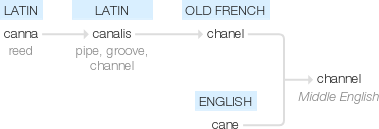Channel
Middle English: from Old French chanel, from Latin canalis ‘pipe, groove, channel’, from canna ‘reed’ (see cane). Compare with canal.
wiktionary
From Middle English chanel (also as canel, cannel, kanel), a borrowing from Old French chanel, canel, from Latin canālis(“groove; canal; channel”). Doublet of canal.
From Middle English chanelen, from the noun (see above).
From a corruption of chainwale.
etymonline
channel (n.)
early 14c., "bed of a stream of water," from Old French chanel "bed of a waterway; tube, pipe, gutter," from Latin canalis "groove, channel, waterpipe" (see canal). Given a broader, figurative sense by 1530s: "that by which something passes or is transmitted" (of information, commerce, etc.); meaning "circuit for telegraph communication" (1848) probably led to that of "band of frequency for radio or TV signals" (1928).
Also "part of a sea making a passageway between land masses, a large strait" (1550s). English Channel is from 1825; the older name was British Channel (by 1730) or simply Channel (Shakespeare). John of Trevisa's Middle English translation of the encyclopedia De Proprietatibus Rerum (c. 1398) has frensshe see for "English Channel." The Channel Islands are the French Îles Anglo-Normandes.
channel (v.)
1590s, "to wear or cut channels in," from channel (n.). Meaning "convey in a channel" is from 1640s. Related: Channeled; channeling.
